erik portillo
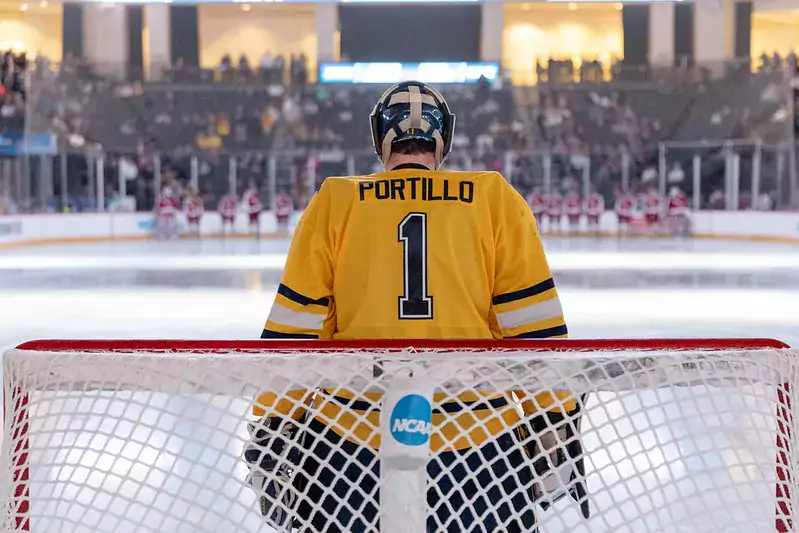
4/6/2023 – Quinnipiac 5, Michigan 2 – 26-12-3, Season Over
Goaltending has a strange place in the sport of hockey. It's common jargon among hockey analysts to say that a given team was "the better team" in a given game, if the balance of chances and territorial map of play favors that team. What that phrase ignores is the goaltending component... we say that a team was "the better team" as if the goalie is not part of the team, when in fact goaltenders are the most important part of the team.
When I analyze hockey, I view goaltending as this final adjustment of sorts. I sit down and look at the two teams' roster of skaters and how they match up to get a sense of the balance of chances, take a peek at the names to get a feel for the caliber of shooters, and then figure out which team is "better". After that, I examine goaltending and adjust my feeling accordingly. In some cases, goaltending is the trump card, which swings a matchup in a direction that the battle of skaters would not suggest. In other cases, goaltending appears to be neutral, with neither team having an edge and thus I assume that the team who has the edge among the skaters will win out.
Of course, when I price in a goaltending adjustment, I still know that in a small sample size, that estimated adjustment could be wrong. Goalies we know are good have been verified to be good over huge sample sizes, entire seasons worth of evidence. The same for so-called "bad" goalies. But the farther down you drill, the more minute you make the sample, the more erratic the variation is. Even in an NHL playoff series, best four-out-of-seven, you can have unexpected goalie performances that don't make a ton of sense. Joonas Korpisalo was largely a terrible goalie from 2016-2022, an .897 SV% in the regular season that was well below NHL average and atrocious in the advanced metrics. But for nine playoff games in the NHL bubble tournament in the summer of 2020? He posted a .941 SV%, won a preliminary series, and made life difficult on a terrific Tampa Bay Lightning team.
That's how goaltending can go in small sample sizes. SV% is a famously variable stat from year to year in the NHL, with randomness and puck luck playing huge roles in that variation. It's why analytics geeks argue against paying goalies large contracts and the analytically-minded, forward-thinking teams tend to go cheap on goaltending and sift through different options, rather than getting tied down to one (Carolina, Colorado, and Toronto have all gone this route). There is fear of the randomness of goaltending in a seven game playoff series in the NHL and justifiably so, which makes it all the more asinine that college hockey goes with one game playoff rounds, where the "goaltending randomness" knob gets cranked up to 11. You can go into a single game feeling good about your goaltender, just to see all your hopes crumble and your worst fears come alive. It's why in the NHL you don't want your season to come down to a single game and why in NCAA Hockey the fan experience of the tournament is trauma-inducing on the scale from euphoric to "fucked".
-----
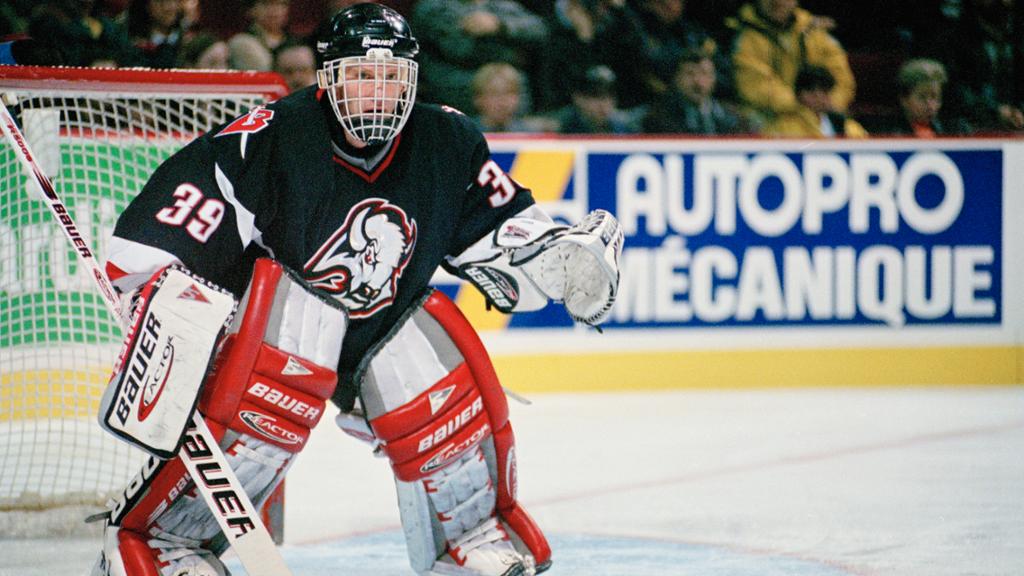
[NHL.com]
I mentioned in the opening paragraph that goaltending is the most important of a hockey team and it's true. They spend more time on the ice than any skater, more time than multiple skaters put together in fact. They also have an outsized and direct role on what goals go in the net, which is 50% of the game. A great goaltender can lift up a team in a way that no great skater, even the best of the best can. You can plop Wayne Gretzky at his peak on an awful hockey team and he will make them better, but their improvement will not be as great as if you dropped 1998 Dominik Hašek on that team.
A great example of this are two teams, the late 90s/early 00s Buffalo Sabres and the Florida Panthers of the same era. Both teams had transcendent talents on an otherwise pitiful roster. For the Sabres, that was Hašek, the greatest goalie of all-time at the peak of his powers. For the Panthers, that was Pavel Bure, a dynamic goalscorer of speed and skill at a time when the NHL was trending away from the rush offense and firewagon hockey that defined his game. Both players were having exceptional seasons, Hašek posting SV% clips in the high .930s, which, for the NHL, is patently crazy, and Bure scoring 58 and 59 goals to lead the NHL, totals that were extremely high for the era.
So both teams had poor rosters with one otherworldly talent firing on all cylinders... what happened? Hašek dragged the 1998 Sabres into the third round and the 1999 team to the Stanley Cup Final, while Bure's 2001 Panthers limped to a bottom five finish in a 30 team league, in spite of his NHL-best goal total. A God-Mode goaltender can singlehandedly drag a terrible team very far in a way that no skater can. And likewise a wretched goaltender can sink an entire team, even if that team is winning the chances battle consistently (2012-13 Michigan Hockey may remember this), in a way that is not remotely comparable to a skater having an off night.
That's true for an entire season and it's true for a specific game. You can play a great game and give the goalie good support, but if the goalie can't make enough saves, you're cooked. And sometimes you get caved in all night long, but the goalie steals it for you. No other position can do that, but a goalie sure can. You need a goalie to play well to win a championship, be it in the NHL or especially in college hockey. When I sang the praises of Erik Portillo in my post-regional column, I made sure to stipulate that "two more like this" was necessary in talking up Michigan Hockey's national title chances because I knew how conditional it all was on goaltending. I just didn't want to have to look back on that column with the thought process "man I'm glad I hedged there".
[AFTER THE JUMP: How this ties into Michigan]
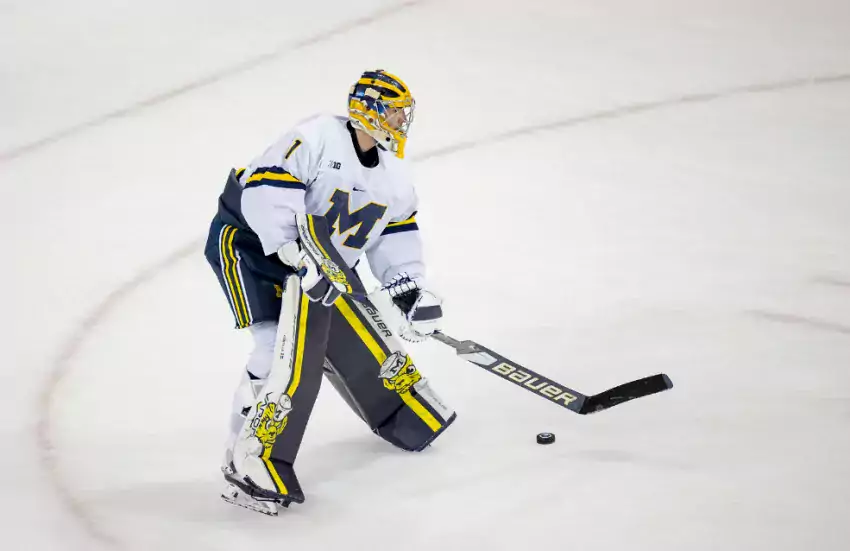
Michigan's goalie search is officially on, as the Ontario Reign, the AHL affiliate of the Los Angeles Kings, announced they've signed Portillo to an ATO contract.
We've signed @umichhockey goaltender Erik Portillo to an ATO! Welcome aboard the #ReignTrain, @ErikPortillo20!
— X - Ontario Reign (@ontarioreign) April 10, 2023
An ATO stands for amateur tryout agreement, but in practice it means Portillo is going pro but agreed not to count this year towards his entry-level clock. He'll be getting his feet wet in the AHL over the remainder the season, and is almost certain to sign an entry-level deal when it's over. (I'll explain further below). Portillo was drafted in his 18-year-old season by Buffalo, who traded his rights last month to the Kings. LA will keep him on an entry-level contract through the 2025-'26 campaign.
Michigan will also lose a trio of seniors who provided some much-needed experience on the back end of this year's team. Gritty Nick Granowicz centered the checking line, and has a COVID season left to play. He scored 36 points in 101 games for Michigan in the last four years, but participated in senior night, and was expected to move on. Ciccolini might be a bigger surprise; the forechecking winger lost a big chunk of the middle of his Michigan career to injury—including the entire 2021-'22 season—but was a drafted player (7th rounder in 2019) and had a few streaks where he was able to convince us he was about to finally break out.
Blueliner Keaton Pehrson was also a senior, and a steady presence over four seasons when it seemed every other defenseman on the roster was getting injured just so Pehrson could stay on the top defensive pairing. Over the years #20 was often the other guy out there with Cam York, Owen Power, or Luke Hughes. His presence there couldn't by justified by a scoresheet, but Pehrson was the epitome of a guy who does his work off the puck. His final year was his best, with 11 assists, and four crucial blocks in the banner-clinching win at Minnesota in the Big Ten Tournament. He never did develop his on-the-puck game.
While the skaters are making room for youth, Michigan will definitely be a player in the goalie portal now, since backup (who came to be a backup) Noah West is also in the portal, and freshman Tyler Shea is an overager who only dressed for three games this year. Brown goalie Mathieu Caron seems like the one and only target for now; the rising junior put up a 2.49 GAA and 92.1 save percentage for a terrible ECAC team. No other goalie in the portal looks plausible, though you never know who else might pry loose.
Putting Portillo's Michigan career in context is difficult since we're still in the shadow of its nadir. Backing up Strauss Mann as a freshman, Portillo put up numbers equal to the elder star. As a blue-chip prospect, it was understood that the massive Portillo would inherit the job in 2021-'22, and Mann duly departed for a pro career. Michigan had virtually no drop-off, as Portillo was one of the best goalies in the country as a sophomore. He was expected to take another step forward as a junior, but it didn't work out that way. He made some incredible stops, had some great games, and enjoyed coming out of his net to play the puck even more than his fans hated when he did that. He also began making crude mistakes, taking awhile to get back up after going to the ice, losing his poise, losing his stick, and most egregiously losing the Frozen Four semifinal after giving up two bank shots and sharp-angle softy.
Part of the problem might have been that Portillo was working without a goalie coach—Steve Shields left the program after his complaints triggered the investigation that brought down Mel Pearson, and the volunteer assistant who replaced Shields took another opportunity in the middle of this season. It's hard not to see a correlation between the coaching situation and Portillo's fundamental breakdowns. It's also hard not to see the giant Swede developing into a fine NHL goalie in a few years.
Why does an amateur deal mean he's gone?
The current collective bargaining agreement between the NHL and its players union keeps entry-level salaries locked to prescribed maximums for their draft positions for (usually) three years. The clock doesn't start until they're out of college, but college hockey ends weeks before the NHL/AHL regular seasons, and sometimes players get signed and spend those last few weeks as professionals, burning through one of their entry-level years in the process. In general teams want to keep their draftees on entry-level contracts, and players want to get past that, so when you see a Matty Berniers jump to the NHL immediately it often means his team is willing to give up an entry-level year to entice him to come.
On the flipside, for a guy who isn't ready for the NHL however, the added franchise value of being on an entry-level contract can be a good thing, since the team that owns his rights can afford to be patient with his development, and might favor a cheap asset who's under team control. However if the player gets all the way through his senior year in college, the team that drafted him actually loses his rights. Portillo was a junior, but could have played one more season and become a free agent. This was the impetus for the team that drafted Portillo in the 3rd round, the Buffalo Sabres, to trade his rights to Los Angeles. At that point we figured Portillo was gone, because teams don't usually acquire those rights unless they're confident they will sign him and he'll forego his senior year.
Signing the ATO and joining Ontario means he intends to sign with LA next year, but also wants to play out the end of the AHL season without having it count as an entry-level season. Even though it literally says "amateur" in the title, signing an ATO is considered signing with a pro team by the NCAA's definition, so Portillo's collegiate eligibility is over.
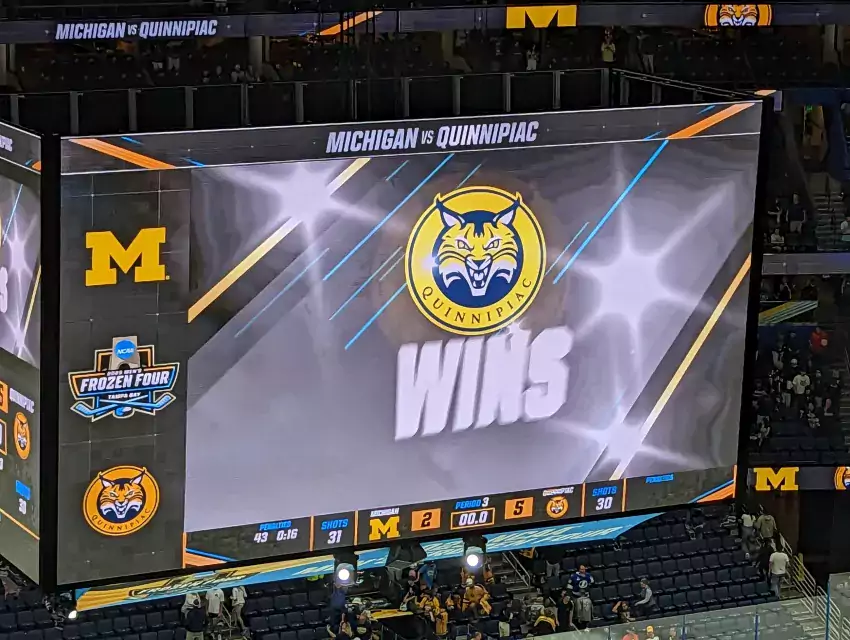
CLICK HERE for Game Recap from Kristy McNeil and other pertinent information.
What just happened (TL;DR): Michigan turned in another stinker performance in a national semifinal. While they did generate some chances in the last couple of periods, they just gave away chances in transition like no other. Unfortunately, Erik Portillo’s (probable) last game in the Michigan crease was probably his worst. He got banked twice and flat out missed a harmless shot from the boards. Quinnipiac played much steadier and and stronger in their zone, waiting for Wolverine mistakes. This year, they came in torrents and the Bobcats pounced and feasted.
FINAL CORSI NUMBERS (www.collegehockeynews.com)
|
|
Total Attempts |
Even Strength |
Power Play |
Close (within 1) |
Even Strength % |
|
Quinnipiac |
57 |
50 |
7 |
37 |
45% |
|
Michigan |
74 |
62 |
12 |
37 |
55% |
Forward Notes.
-Quinnipiac got the game style and scoring sequence that they wanted in the first two periods. They all but erased Michigan’s offense from their forward lines. The bottom three lines for Michigan mostly went unnoticed as they collectively managed just five shots on net all evening. Depth scoring has been something that the Wolverines got for enough of the year, but they struggled just to get a puck on Yaniv Perets all night. Eric Ciccolini did ring the iron in the third period, probably Michigan’s best chance in the final stanza.
-After having a rough first period, the top line did kick it into gear and generated plenty of chances in the second (not quite as many in the third). Adam Fantilli scored a typical blast from the dot in the second period to tie it after Luke Hughes teed him up nicely. Rutger McGroarty and Gavin Brindley both had great chances to get on the board all night. This was not a vintage Michigan offensive night –thanks mostly to suffocating Bobcat defense, but the top line did a lot. Hopefully, it’s not the last time we see them together.
-There’s really not a whole lot that’s been left unsaid. Look, Adam Fantilli is the best player I’ve seen at Michigan. Kyle Connor was great, but Adam is at a different level. He also has that MacKinnon fire and competitiveness. He scored and somehow his the underside of the bar without scoring. He creates, he muscles, he dishes…he backchecks. He stayed in the middle of the ice looking around and waving to the fans after the game. That doesn’t mean it’s a done deal that he’s leaving…but it easily could be, too. I wouldn’t blame him. Either way, Adam, (if you’re reading this), it’s been amazing watching you all year. I’ll be hard pressed to not get your jersey when you’re tearing up the NHL.
Defense Notes.
-WOOF. The in-zone defense wasn’t the worst it’s been all season, but it was inconsistent, especially early. They did settle down a bit as the game progressed. The transition tracking was pretty horrendous, though. That will be discussed later.
-Unfortunately for Luke Hughes, his last game in Maize and Blue will be a haunting one. He’s been tremendous and other-worldly many times in his career. On Thursday night in Tampa, though…it was rough. Not only did he turn the puck over too many times, he also got toasted on the Jacob Quillan breakaway goal. Just afterwards, he left a QCat alone at the top of the crease for an easy deflection that ultimately went high. Now, ESPN reported that he was regurgitating consumables into a trash can behind the bench…so that could easily have had some impact, ha. Luke did make an awesome dish for Adam Fantilli for his game-tying blast from the dot. Luke has been quite the interesting case in his career. Many highs and lows. It’s unfortunate for it to end like this.
-On a much more positive note, Seamus Casey was the best non-Adam Fantilli player on the ice for Michigan. His Makar-esque goal in the first period, dancing through basically every yellow sweater before slipping the puck around Perets temporarily tied the game. He also shook another Bobcat and drew a penalty, getting into the slot. Casey also used his body well to keep the puck in the zone and not be out-muscled by a larger opposing forward. That is a really good sign. The shakes and dekes are expected…adding some body positioning to win a physical battle at the blue line is +++. He could have been at fault for OMRs, but I didn’t see any specifically…but on a night when there were like a million, everyone probably was at one point

another weekend in Allentown, another Frozen Four
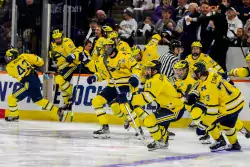
Adam and Mackie and Erik and Just Like Football and SEE YOU IN TAMPA!
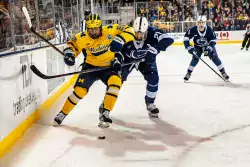
time to slay the Ice Lions

Sometimes, you hang eleven...
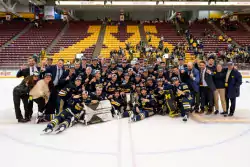
Winning Big Ten (Tournament) titles never gets old

MICH-AGAIN! Back to Back Big Ten Tournament Champions!

time to raise another banner
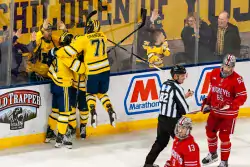
roasted buckeyes

Just like football.
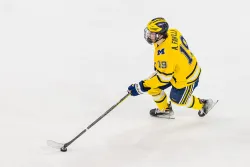
Get the brooms. Sing the song. Jump Around. See you at Yost next Saturday.
42